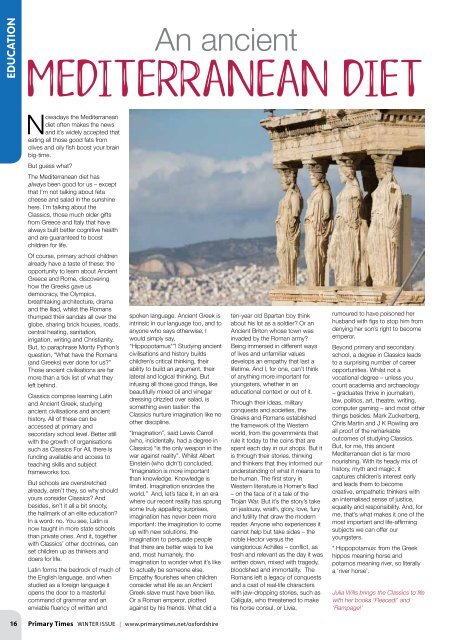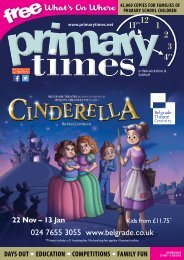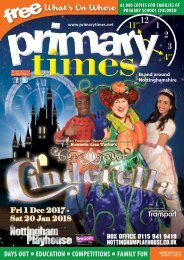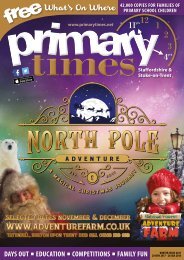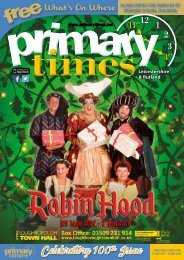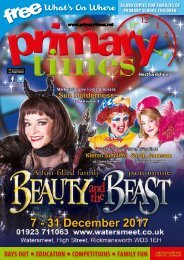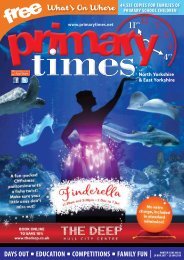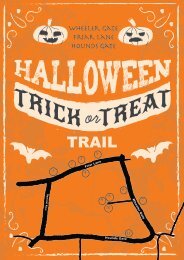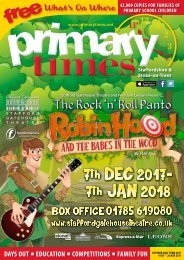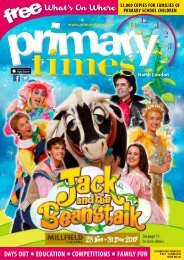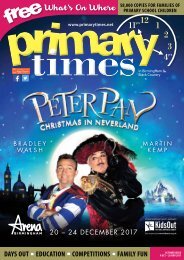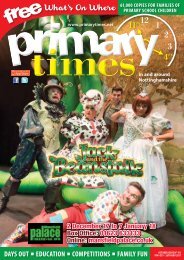You also want an ePaper? Increase the reach of your titles
YUMPU automatically turns print PDFs into web optimized ePapers that Google loves.
EDUCATION<br />
An ancient<br />
Mediterranean diet<br />
Nowadays the Mediterranean<br />
diet often makes the news<br />
and it’s widely accepted that<br />
eating all those good fats from<br />
olives and oily fish boost your brain<br />
big-time.<br />
But guess what?<br />
The Mediterranean diet has<br />
always been good for us – except<br />
that I’m not talking about feta<br />
cheese and salad in the sunshine<br />
here. I’m talking about the<br />
Classics, those much older gifts<br />
from Greece and Italy that have<br />
always built better cognitive health<br />
and are guaranteed to boost<br />
children for life.<br />
Of course, primary school children<br />
already have a taste of these: the<br />
opportunity to learn about Ancient<br />
Greece and Rome, discovering<br />
how the Greeks gave us<br />
democracy, the Olympics,<br />
breathtaking architecture, drama<br />
and the Iliad, whilst the Romans<br />
thumped their sandals all over the<br />
globe, sharing brick houses, roads,<br />
central heating, sanitation,<br />
irrigation, writing and Christianity.<br />
But, to paraphrase Monty Python’s<br />
question, “What have the Romans<br />
(and Greeks) ever done for us?”<br />
Those ancient civilisations are far<br />
more than a tick list of what they<br />
left behind.<br />
Classics comprise learning Latin<br />
and Ancient Greek, studying<br />
ancient civilisations and ancient<br />
history. All of these can be<br />
accessed at primary and<br />
secondary school level. Better still<br />
with the growth of organisations<br />
such as Classics For All, there is<br />
funding available and access to<br />
teaching skills and subject<br />
frameworks too.<br />
But schools are overstretched<br />
already, aren’t they, so why should<br />
yours consider Classics? And<br />
besides, isn’t it all a bit snooty,<br />
the hallmark of an elite education?<br />
In a word: no. You see, Latin is<br />
now taught in more state schools<br />
than private ones. And it, together<br />
with Classics’ other doctrines, can<br />
set children up as thinkers and<br />
doers for life.<br />
Latin forms the bedrock of much of<br />
the English language, and when<br />
studied as a foreign language it<br />
opens the door to a masterful<br />
command of grammar and an<br />
enviable fluency of written and<br />
spoken language. Ancient Greek is<br />
intrinsic in our language too, and to<br />
anyone who says otherwise, I<br />
would simply say,<br />
“Hippopotamus*”! Studying ancient<br />
civilisations and history builds<br />
children’s critical thinking, their<br />
ability to build an argument, their<br />
lateral and logical thinking. But<br />
infusing all those good things, like<br />
beautifully mixed oil and vinegar<br />
dressing drizzled over salad, is<br />
something even tastier: the<br />
Classics nurture imagination like no<br />
other discipline.<br />
“Imagination”, said Lewis Carroll<br />
(who, incidentally, had a degree in<br />
Classics) “is the only weapon in the<br />
war against reality”. Whilst Albert<br />
Einstein (who didn’t) concluded,<br />
“Imagination is more important<br />
than knowledge. Knowledge is<br />
limited. Imagination encircles the<br />
world.” And, let’s face it, in an era<br />
where our recent reality has sprung<br />
some truly appalling surprises,<br />
imagination has never been more<br />
important: the imagination to come<br />
up with new solutions, the<br />
imagination to persuade people<br />
that there are better ways to live<br />
and, most humanely, the<br />
imagination to wonder what it’s like<br />
to actually be someone else.<br />
Empathy flourishes when children<br />
consider what life as an Ancient<br />
Greek slave must have been like.<br />
Or a Roman emperor, plotted<br />
against by his friends. What did a<br />
ten-year old Spartan boy think<br />
about his lot as a soldier? Or an<br />
Ancient Briton whose town was<br />
invaded by the Roman army?<br />
Being immersed in different ways<br />
of lives and unfamiliar values<br />
develops an empathy that last a<br />
lifetime. And I, for one, can’t think<br />
of anything more important for<br />
youngsters, whether in an<br />
educational context or out of it.<br />
Through their ideas, military<br />
conquests and societies, the<br />
Greeks and Romans established<br />
the framework of the Western<br />
world, from the governments that<br />
rule it today to the coins that are<br />
spent each day in our shops. But it<br />
is through their stories, thinking<br />
and thinkers that they informed our<br />
understanding of what it means to<br />
be human. The first story in<br />
Western literature is Homer’s Iliad<br />
– on the face of it a tale of the<br />
Trojan War. But it’s the story’s take<br />
on jealousy, wrath, glory, love, fury<br />
and futility that draw the modern<br />
reader. Anyone who experiences it<br />
cannot help but take sides – the<br />
noble Hector versus the<br />
vainglorious Achilles – conflict, as<br />
fresh and relevant as the day it was<br />
written down, mixed with tragedy,<br />
bloodshed and immortality. The<br />
Romans left a legacy of conquests<br />
and a cast of real-life characters<br />
with jaw-dropping stories, such as<br />
Caligula, who threatened to make<br />
his horse consul, or Livia,<br />
rumoured to have poisoned her<br />
husband with figs to stop him from<br />
denying her son’s right to become<br />
emperor.<br />
Beyond primary and secondary<br />
school, a degree in Classics leads<br />
to a surprising number of career<br />
opportunities. Whilst not a<br />
vocational degree – unless you<br />
count academia and archaeology<br />
– graduates thrive in journalism,<br />
law, politics, art, theatre, writing,<br />
computer gaming – and most other<br />
things besides. Mark Zuckerberg,<br />
Chris Martin and J K Rowling are<br />
all proof of the remarkable<br />
outcomes of studying Classics.<br />
But, for me, this ancient<br />
Mediterranean diet is far more<br />
nourishing. With its heady mix of<br />
history, myth and magic, it<br />
captures children’s interest early<br />
and leads them to become<br />
creative, empathetic thinkers with<br />
an internalised sense of justice,<br />
equality and responsibility. And, for<br />
me, that’s what makes it one of the<br />
most important and life-affirming<br />
subjects we can offer our<br />
youngsters.<br />
* Hippopotamus: from the Greek<br />
hippos meaning horse and<br />
potamos meaning river, so literally<br />
a ‘river horse’.<br />
Julia Wills brings the Classics to life<br />
with her books ‘Fleeced!’ and<br />
‘Rampage!’<br />
16<br />
<strong>Primary</strong> <strong>Times</strong> WINTER Issue | www.primarytimes.net/oxfordshire


